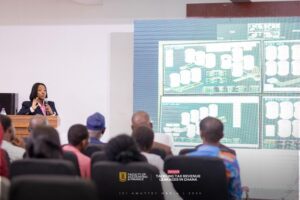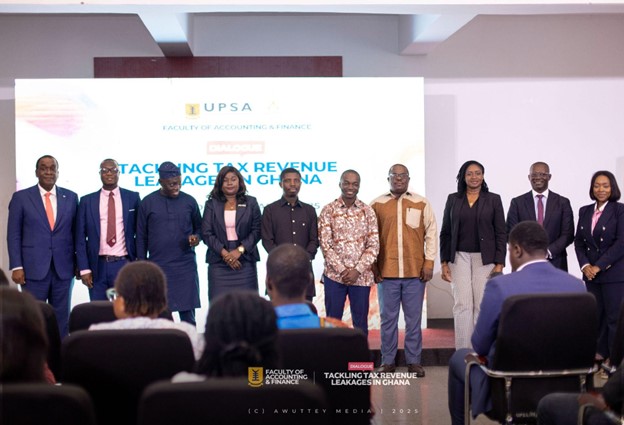- commends SML’s efforts
- calls for revamp of risk-reward framework
By Ebenezer Chike Adjei NJOKU
Dr. Eric Boachie Yiadom, a senior lecturer at the University of Professional Studies, Accra (UPSA), has argued that the most reliable path to curbing tax revenue leakages lies in the strategic deployment of technology across critical sectors, especially the petroleum and mineral value chains.
Speaking at a public dialogue on tackling tax revenue leakages hosted by the Faculty of Accounting and Finance at UPSA, Dr. Yiadom pointed to Strategic Mobilization Ghana Ltd (SML) as a practical case study, commending the firm’s role in deploying real-time monitoring systems to improve transparency and boost state revenue collection.

“We have historically had discrepancies in the revenue reporting between the lifting volumes and the taxable volumes by National Petroleum Authority (NPA) and Ghana Revenue Authority (GRA).
“Before the engagement of SML in May 2020, there was a discrepancy of about 3.2 billion litres. After SML’s engagement, within four months, that figure dropped to 260 million litres—a reduction of 91.9 percent,” he stated.
He described the real-time surveillance and reconciliation systems deployed by SML as akin to placing a “second eye” on petroleum flows, comparing it to the functions of an internal auditor in corporate governance.
According to him, SML’s use of ultrasonic flow meters, AI-powered surveillance, and automated reconciliation systems offers a second layer of verification to data supplied by the National Petroleum Authority (NPA).
Dr. Yiadom, said he personally visited SML’s facilities to verify the company’s operations, adding that the engagement of SML must be judged by its outcomes, rather than speculative or politically tinged narratives.
“You see, when you read a report, you have to go beyond what the report is saying, to find out things by yourself,” he remarked, referring to public criticisms and findings from third-party audits, including KPMG. “Some of these reports are based on their primary source to and find out whether there is a claim to support what SML is saying, or there is no claim to support it,” he said.
Dr. Yiadom also defended the controversial risk-reward payment model under which SML operates, describing it as fiscally prudent for the government, particularly in innovative sectors where results can be directly measured.
“Risk-reward basis means that the company should bear all the costs. Then, you will only be paid based on your performance. If your performance does not bring any addition, you will get zero, and all the investment will go to zero. The government will not have to pay a dime for the investment made by the company,” he noted.
The structure, he argued, protects public funds by linking compensation to measurable performance, while simultaneously encouraging private investment in high-risk monitoring infrastructure.
On the back of these initiatives, Dr. Yiadom welcomed SML’s recent foray into the upstream petroleum and solid minerals sectors, describing them as logical and much-needed extensions of the firm’s work in the downstream petroleum value chain.

Dr. Yaa Serwaa Sarpong, Director of Support Services at SML Ghana, offered a preview of the company’s upstream monitoring capabilities during the same event.
She said the system replicates the downstream monitoring architecture and provides the Ghana Revenue Authority (GRA) and other state agencies with real-time insight into crude oil production and offtake volumes.
“In real time, Ghana will be able to know exactly what is going on upstream. We know how much petroleum products, how much that has been extracted and sold, and is being taken offshore,” she said.
She added that the system will be deployed across Ghana’s three Floating production storage and offloading platforms (FPSOs) and includes production flow meters, tank-level sensors, and offtake meters to capture data on each litre of crude extracted, stored, and sold.
The system is designed to enable reconciliation between production, storage, and export volumes—an area previously prone to opacity and under-reporting.
Hamdan Abubakar, Head of Engineering at SML, provided further insight into the upstream system, stating: “With this deployment, we are able to tell the quantity of products that have been lifted. Every litre of crude oil that is being produced and stored will be captured.”
In addition to the petroleum sector, SML is developing a technology solution for monitoring solid minerals, particularly gold, from mining sites to refineries. The system uses scanning and AI analytics to assess the purity and composition of gold bars, calculate royalties, and track movement through the value chain.
“We are able to track the gold and, when the gold gets to the refinery and the report gets back, we are able to tell details of the report,” Mr. Abubakar noted. “With our AI system, we are able to calculate the royalties that are supposed to be paid from that gold bar,” he added.
The company’s upcoming ‘SML Gold Nova’ is designed to be operated in partnership with the GRA and the Minerals Commission. It is expected to go live in the coming weeks, pending full onboarding of industry players.
Dr. Yiadom concluded by encouraging students, academics, and professionals to engage critically and constructively with data and policy developments, and to support the integration of technology across all high-revenue sectors.
“If there is a way we can make it better, if we can criticise and improve it, let us criticise and rescue our nation, rather than criticize and destroy it,” he said.










